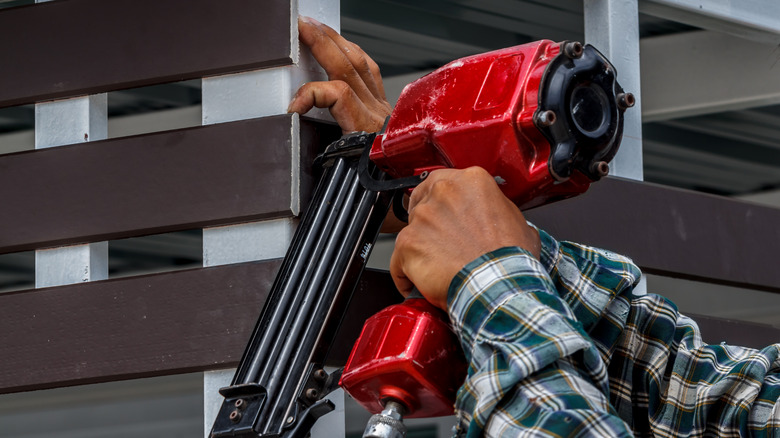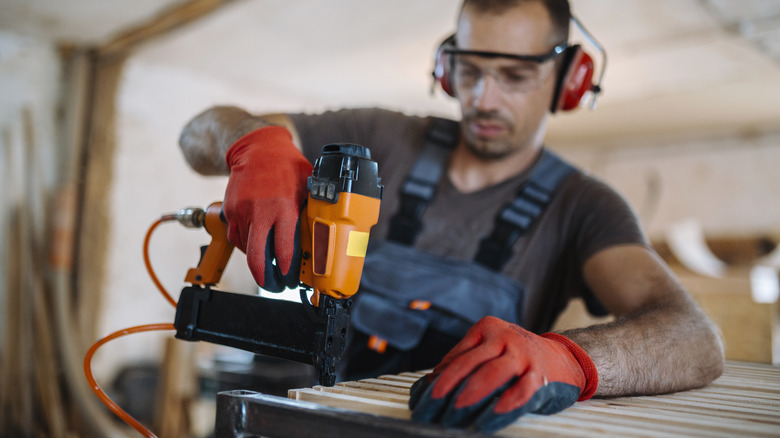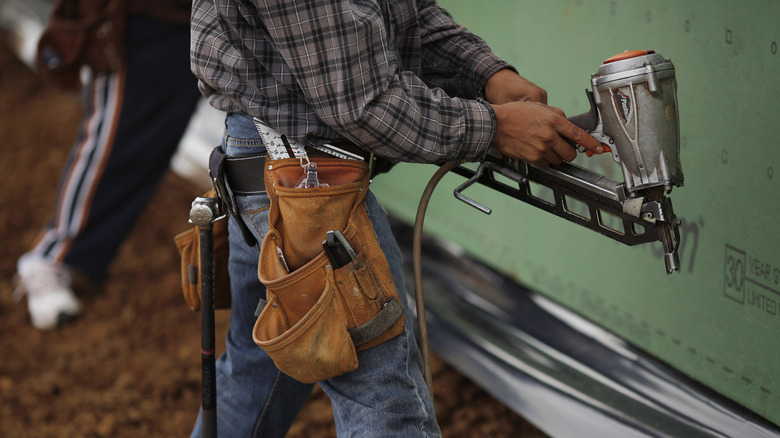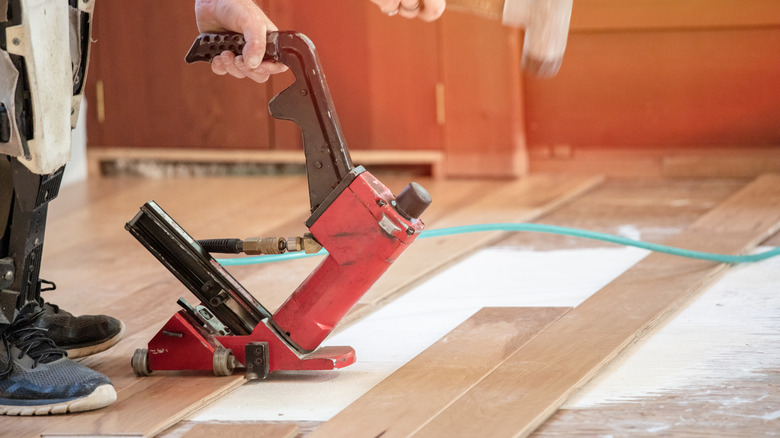Your Guide To Selecting The Right Type Of Nail Gun For Your Next Home Improvement Project
When you're beginning a project that requires you to secure multiple pieces throughout, it might be a good idea to invest in a nail gun. These handy devices allow you to drive nails quickly and precisely without having to stop and hammer each one, so they can seriously speed up your process and leave you with a more professional-looking final product. With that being said, it can be a bit of a challenge to determine exactly what type of nail gun you need in your situation. There are nine types of nail guns commonly available on the market — framing, siding, finishing, roofing, pin nail, brad nail, flooring, palm nailer, and staple guns — all with similar abilities, but slightly different applications.
Thankfully, several of these nail guns are designed for a specialized use and named accordingly, so if you know you're going to be laying shingles, it's obvious your best bet will be a roofing nail gun. In other situations, however, things can get a bit more nuanced. Several of these types of nail guns can be subbed for one another or used for a wide variety of projects, and it's important to understand exactly what you're looking for before heading to the hardware store to make your final selection.
Consider the thickness of your materials
The first thing you should determine is how deep you need the nails to go and, subsequently, how long your nails should be. Using a nail gun isn't like picking up a hammer — the clip you buy is only compatible with one size and length of nail — so it's important to choose something you know will work throughout your project. Too long, and you could deal with dangerous pieces of nail jutting through the back of your surface. Too short, and your pieces won't be secured.
For thin materials and light-duty jobs like upholstery and simple carpentry, you can utilize a staple gun to get results without driving too deep. On the other hand, framing nail guns are one of the more heavy-duty options out there, including a clip that holds nails that are up to 3 ½ long. For projects in between, there are siding and roofing nail guns. Roofing nail guns usually use nails from ¾ to 1 ¾ inches long, while siding nail guns work with nails 1 ½ to 2 ½ inches long.
Determine the gauge of nails you need
Another important factor in your decision is finding a nail gun that works with nails that are the proper gauge for your project. Some materials — especially wood — are prone to splitting when you drive a larger nail through, but heavier materials need thicker gauge nails so they don't bend or snap with weight. As a general rule of thumb, the lighter the piece, the thinner the gauge and vice versa.
The thinnest gauge available for nail guns is obviously going to be heavy-duty staples, which can be used for textiles and even installing trim in certain situations. Next up is pin nailers, hence the name. These utilize tiny 23-gauge nails that almost look like sewing pins and are great for ornamental trim, cabinetry, and other projects where you're worried about the wood splitting. Brad nails are typically about 18 gauge, so still relatively small and useful for light trim pieces, while finish nailers use 15- and 16-gauge nails that can hold a bit more weight for things like molding. Siding and framing nail guns are on the thickest end of the spectrum and are good for heavier-duty installations and building projects.
Take your final finish into account
When it comes to determining the correct gauge of nail you need — and, subsequently the type of nail gun you should choose — you should also consider the appearance of your final product. Thicker gauge nails are harder to conceal and can look more obvious once you're finished. Obviously, for projects like framing a wall or building a piece of soon-to-be upholstered furniture, this doesn't matter much, but choosing the proper gauge is important when it comes to things like cabinetry and trim.
If you want a seamless look and aren't supporting much weight, a staple gun, pin nailer, or brad nailer are your best options. Of course, your first consideration should always be the integrity of your final build — it doesn't matter if you get a seamless finish if it falls apart in a matter of days. But once you know what gauge you need to support your project, try to choose the thinnest nails possible to avoid any tedious processes like having to fill nail holes before painting your trim.
Factor in the hardness of your materials
Most common nail guns are designed for use on projects that include wood, siding, and shingles, so you shouldn't run into any power issues if you're working on these materials. For super heavy-duty projects, however, you might have to get more specialized with your nail gun selection.
While less frequently used than most nail guns, concrete, metal, and masonry fasteners exist if you need to pack a major punch. These tools are often more powerful than necessary for an everyday project, but if you're attempting to secure a metal beam to concrete, for example, they can do the job much better than a typical nail gun. Unfortunately, their extra power means that they're on the pricier side of things — typically around $300 to $900 — and that they're not well-suited for most DIY projects. If you find yourself in need of a tool like this that you likely won't have to use again, consider a rental to get the job done without completely blowing your budget.
Note any special requirements
In some situations, a typical nail gun just won't cut it. If you're working in a tiny space and don't have the ability to maneuver a larger piece of equipment, consider a palm nailer. These tiny devices give you a wider range of movement and allow you to drive nails in hard-to-reach areas, right from the palm of your hand. Their downside, however, is that unlike your standard nail gun with a clip, you have to load each nail individually, meaning you'll have to sacrifice a bit of convenience and speed in favor of flexibility.
Additionally, there are specially-designed flooring nail guns if you're planning to — you guessed it — install wood flooring. These guns allow you to insert specialized nails called cleats at a precise angle to give you a secure and seamless finish. These nail guns don't really have any other useful applications, so unless you're going to be frequently installing flooring, they're another type of nail gun that is most economical to rent rather than buy.





